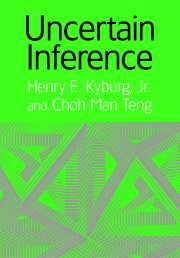Book contents
- Frontmatter
- Contents
- Preface
- 1 Historical Background
- 2 First Order Logic
- 3 The Probability Calculus
- 4 Interpretations of Probability
- 5 Nonstandard Measures of Support
- 6 Nonmonotonic Reasoning
- 7 Theory Replacement
- 8 Statistical Inference
- 9 Evidential Probability
- 10 Semantics
- 11 Applications
- 12 Scientific Inference
- Names Index
- Index
12 - Scientific Inference
Published online by Cambridge University Press: 07 December 2009
- Frontmatter
- Contents
- Preface
- 1 Historical Background
- 2 First Order Logic
- 3 The Probability Calculus
- 4 Interpretations of Probability
- 5 Nonstandard Measures of Support
- 6 Nonmonotonic Reasoning
- 7 Theory Replacement
- 8 Statistical Inference
- 9 Evidential Probability
- 10 Semantics
- 11 Applications
- 12 Scientific Inference
- Names Index
- Index
Summary
Introduction
We have abandoned many of the goals of the early writers on induction. Probability has told us nothing about how to find interesting generalizations and theories, and, although Carnap and others had hoped otherwise, it has told us nothing about how to measure the support for generalizations other than approximate statistical hypotheses. Much of uncertain inference has yet to be characterized in the terms we have used for statistical inference. Let us take a look at where we have arrived so far.
Objectivity
Our overriding concern has been with objectivity. We have looked on logic as a standard of rational argument: Given evidence (premises), the validity (degree of entailment) of a conclusion should be determined on logical grounds alone. Given that the Hawks will win or the Tigers will win, and that the Tigers will not win, it follows that the Hawks will win. Given that 10% of a large sample of trout from Lake Seneca have shown traces of mercury, and that we have no grounds for impugning the fairness of the sample, it follows with a high degree of validity that between 8% and 12% of the trout in the lake contain traces of mercury.
The parallel is stretched only at the point where we include among the premises “no grounds for impugning. …” It is this that is unpacked into a claim about our whole body of knowledge, and embodied in the constraints discussed in the last three chapters under the heading of “sharpening.”
- Type
- Chapter
- Information
- Uncertain Inference , pp. 270 - 290Publisher: Cambridge University PressPrint publication year: 2001



